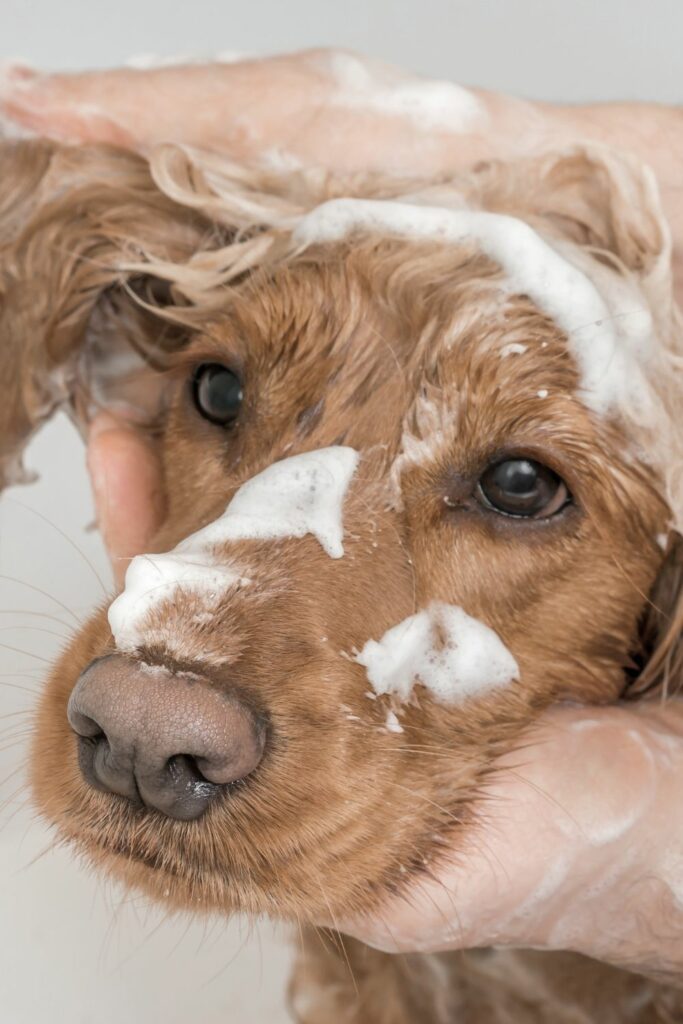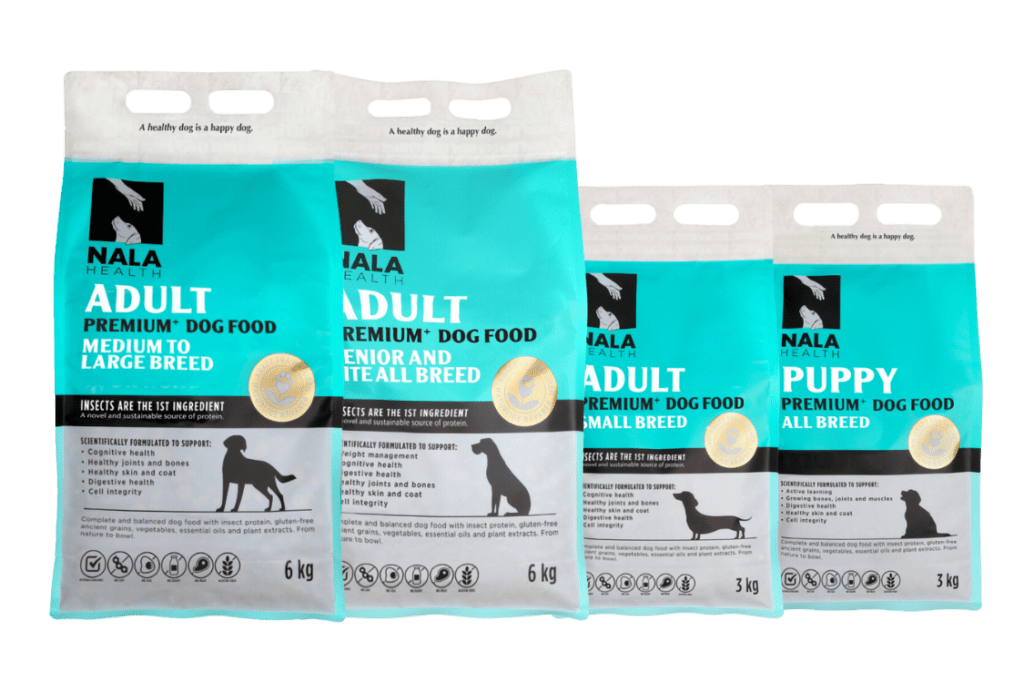Unraveling the Mystery of Itchy Skin in Dogs
 Synne Hemsen Berg
Synne Hemsen Berg
Itchy skin is one of the most common issues dogs face, and it can be both frustrating for them and concerning for you. If your dog is constantly scratching, licking, or biting their skin, it could be a sign of an underlying problem. Known medically as pruritus, itchy skin can be caused by a variety of conditions, including allergies, parasites, or infections. In this blog, we’ll explore the causes, symptoms, and treatment options to help you manage and relieve your dog’s discomfort.
Understanding Itchy Skin in Dogs
Think of your dog’s skin as a sensitive antenna, constantly tuned to detect signals from the environment. When an allergen, parasite, or irritant appears, it’s like static disrupting the calm. The skin detects the issue and alerts the nervous system, which amplifies the itch and sends it to the brain.
Addressing the source of irritation—like fleas, allergies, or infections—is like fixing the static. By treating the root cause, you can help your dog find relief and restore their skin’s natural balance.

The Process Behind the Itch
Just like a security system, your dog’s skin is equipped with specialized sensors known as itch receptors. These receptors are sensitive to various stimuli, including allergens, parasites, irritants, and even changes in temperature or humidity. The process your dogs body undergoes when it is itchy is as follows:
- Irritation: When pollen, a parasite, or irritant comes into contact with your dog’s skin, it can trigger reactions in the skin. For example, a flea bite introduces irritating saliva into the skin, while an allergen like pollen or dust mites can provoke an immune response.
- Signals: In response to the perceived threat, the body releases chemical signals, including histamine.
- Message: These substances act as messengers, alerting the body that there is “danger”.
- Scratching: In an attempt to alleviate the itch, your dog instinctively begins to scratch, lick, or bite at the affected area. While scratching may provide temporary relief by interrupting the nerve signals, it can also exacerbate inflammation and damage the skin further.
For food allergies, the process that triggers itching is a bit different. When your dog eats food they’re allergic to, their immune system reacts by releasing special antibodies called IgE. These antibodies start a chain of reactions, releasing chemicals like histamines. These cause inflammation in the body and skin resulting in itching. This itching can also lead to further skin infections, making the itching even worse.
Common Causes of Itchy Skin
Itchy skin in dogs can stem from various underlying factors, ranging from external irritants to internal imbalances. Understanding these common causes is crucial for pinpointing the root of your dog’s discomfort and implementing targeted treatment strategies. That’s why it’s crucial to get your dog checked out by a vet if they’re constantly itching.

1. Allergies
Allergies are a leading cause of itchy skin, also known as atopic dermatitis in dogs and can manifest in different forms, including:
- Food Allergies: Dogs can develop sensitivities or allergies to certain ingredients in their diet, such as common proteins (e.g., beef, chicken, eggs and soy), gluten, dairy, maize, wheat or additives. Common symptoms include itching, skin inflammation, gastrointestinal issues, and recurring eye and ear infections.
- Environmental Allergies: Dogs can be allergic to various environmental allergens such as pollen, dust mites, flea spit, mould spores, and grass. Exposure to these allergens can trigger allergic reactions, resulting in itchiness, redness, and skin irritation.
2. Parasites
External parasites, such as fleas, ticks, and mites, are notorious for causing itchy skin in dogs. These external parasites not only bite and feed on the dog’s blood but also introduce saliva or toxins into the skin, triggering allergic reactions and irritation.
- Fleas: Fleas are one of the most common external parasites affecting dogs. Their saliva contains allergenic proteins that can cause severe itching, skin inflammation, and secondary infections.
- Ticks: Ticks attach themselves to the dog’s skin and feed on its blood, often causing localized irritation, redness, and itchiness. Additionally, certain tick species can transmit diseases that further compromise the dog’s health.
- Mites: Mites, such as sarcoptic and demodectic mites, can infest a dog’s skin and hair follicles, leading to a condition known as mange. Symptoms include intense itching, hair loss, crusty skin, and secondary bacterial infections.
3. Skin Infections
Bacterial and fungal infections can disrupt the skin’s natural balance, leading to inflammation, itching, and discomfort.
- Bacterial Infections: Common bacterial skin infections in dogs include staph, hot spots, and folliculitis. These infections often occur secondary to underlying conditions such as allergies or trauma to the skin, exacerbating the itching and skin irritation.
- Fungal Infections: Fungi like candida can infect a dog’s skin, causing conditions such as yeast dermatitis and ringworm. These infections typically thrive in warm, moist environments, leading to itchiness, redness, and flaky skin.

4. Dry Skin
Just like humans, dogs can experience dry skin, especially during the winter months or in arid climates. Dry skin lacks proper moisture and oils, making it prone to itching, flakiness, and irritation.
5. Hormonal Imbalances
Hormonal imbalances, such as thyroid disorders and adrenal dysfunction, can affect a dog’s skin health and contribute to itching and hair loss. These imbalances disrupt the normal functioning of the skin and may require medical intervention to manage.
6. Other Medical Conditions
Lastly, various underlying medical conditions, such as immune disorders, autoimmune diseases, and cancer, can manifest with symptoms of itchy skin in dogs. Identifying and addressing these underlying health issues is essential for effective management and relief of itchiness.
Home Remedies for Itchy Skin
While a trip to the vet is often necessary for treating itchy skin in dogs, there are also some home remedies you can try to provide your furry friend with relief:
- Oatmeal Baths: Oatmeal has anti-inflammatory properties that can help calm irritated skin. Fill a pantyhose with 1 cup of oatmeal and soak this in a bucket of warm water for 10-15 minutes. Wash your dog with this mixture. Alternatively, you can also use dog-friendly shampoos with oatmeal like this one from Pannatural Pets.

- Coconut Oil: Apply coconut oil topically to your dog’s skin to moisturize and soothe dry, itchy patches. Coconut oil has antimicrobial properties and can help reduce inflammation. It is also safe for dogs to lick.
- Apple Cider Vinegar Rinse: Dilute 50/50 apple cider vinegar with water and use it as a rinse for your dog. Apple cider vinegar has antibacterial and antifungal properties that can help alleviate itching and restore skin pH balance.
- Aloe Vera Gel: Apply pure aloe vera gel to your dog’s itchy areas to soothe irritation and promote healing. Aloe vera has cooling and anti-inflammatory effects that can provide relief from itching and inflammation.
- Omega-3 Fatty Acids: Find a diet that contains omega 3, such as Nala Health, or incorporate supplements into your dog’s diet to support skin health and reduce inflammation. Fish oil or marine algae supplements can help improve the condition of your dog’s skin and coat.
Remember to always consult with your vet before trying any home remedies, especially if your dog has underlying health conditions or is on medication.
Nutrition for Good Skin Health
Maintaining a balanced and nutritious diet is essential for promoting good skin health in dogs. Here are some dietary tips to support your dog’s skin:
- High-Quality Protein: Ensure your dog’s diet includes high-quality protein sources, such as game meat, black soldier fly larvae, lamb or wild-caught fish. Protein is essential for skin and coat health and helps support tissue repair and regeneration.
- Omega-3 and Omega-6 Fatty Acids: look for foods with a balanced content of omega-3 and omega-6 fatty acids. Omega 3 can come from marine algae and fish. Omega 6 comes from plants such as coconut oil, canola oil and flaxseeds. These fatty acids help maintain the skin’s natural barrier function and reduce inflammation.
- Vitamins and Minerals: Provide your dog with a balanced diet that contains essential vitamins and minerals, including vitamins A, E, and zinc. These nutrients play a crucial role in skin cell turnover, wound healing, and immune function.
- Hydration: Ensure your dog has access to fresh, clean water at all times to support proper hydration. Adequate hydration is essential for maintaining skin moisture and elasticity.

- Avoid Allergens: If your dog has food allergies or sensitivities, avoid feeding them ingredients that trigger allergic reactions. Common allergens include wheat, corn, soy, and dairy products. Nala Health offers premium allergy-friendly food.

- Zinc: Zinc is a mineral that plays a crucial role in skin health and wound healing. It supports immune function, collagen synthesis, and the maintenance of healthy skin cells. Zinc supplements may be beneficial for dogs with dermatitis. Always consult with a vet before giving your dog supplements.
- Probiotics: Probiotics are beneficial bacteria that promote gut health and immune function. A healthy gut microbiome is essential for proper nutrient absorption and immune regulation, which can indirectly influence skin health. Find dog food, such as Nala Health, that already contains probiotics.
- Bone broth: A food topper rich in collagen, amino acids, glucosamine and minerals. Make sure the bone broth you use is appropriate for dogs, and better yet make it yourself.
By feeding your dog a nutritious diet tailored to their individual needs and incorporating ingredients that are beneficial for the skin, you can help keep their skin healthy and itch-free from the inside out. If you have concerns about your dog’s diet or skin health, consult with your vet for personalized recommendations.
Conclusion
In conclusion, understanding the complexities of itchy skin in dogs is key to providing them with the care and relief they need. Whether it’s allergies, parasites, infections, dry skin, or other medical conditions causing the itch, being proactive and attentive to your dog’s needs is paramount. Remember, your veterinarian is your ally in the journey to combating itchy skin in dogs. With their expertise and guidance, you can develop a tailored plan to address your dog’s specific needs and provide them with the relief they deserve.
Sources: The Ultimate Pet Health Guide, by Gary Richter and Itchy dogs – a natural health guide for dogs with skin problems, by Julie Massoni

